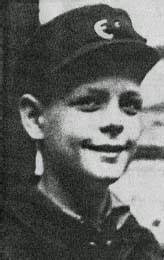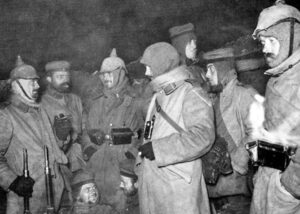Mustard gas. Muddy trenches. No Man’s Land.
In 1914, Britain, France, and Russia united to stop the greedy German kaiser. Surely, they’d have him running for home, his tail between his legs by Christmas.
But Christmas found both armies weary, wet, and cold. Their hopes for protection lay in underground bunkers and trenches dug into the earth, corridors to allow communications among the troops. If anything moved above ground, the enemy shot to kill.
Can you imagine the hatred? The bitterness? The exhaustion? Thousands of men stuck in a form of hell on earth.
And yet…
As troops settled into a miserable Christmas Eve along the western front, the Allied soldiers heard something familiar. A Christmas carol. But sung in German. The British joined the song. Two opposing armies, each with a Christian heritage, worshiping their Lord and Savior on the night commemorating His birth.
The song died away, and a call came from the opposite camp. “Let’s meet in the middle of No Man’s Land.”
“We don’t trust you,” came the reply. “You will shoot us.”
“No. Look. We are coming out. Don’t shoot.”
In pockets all along the front, one side ventured out of the trenches, arms up to show no weapons, and the enemy climbed out of their trenches to meet them. They sang the carols together. They traded gifts of cigarettes and food. They shook hands and returned to their trenches. On December 26th, the slaughter began again.
The Christmases of 1915 through 1917 found no moments of peace. Both Allied and Central leaders threatened soldiers if they dared to create an impromptu truce. We only know this Christmas miracle happened because soldiers wrote home about it.
Fast Forward to World War II
Once again, the official declaration was: No impromptu truce on Christmas. We. Are. At. War.
But one individual’s story has survived the decades, and perhaps, there are many more never recorded.

Fritz Vincken
Fritz remembered his mother’s prayer.
“‘Komm, Herr Jesus,'” she prayed, ‘and be our guest.’
“There were tears in her eyes and as I looked around the table, I saw that the battle-weary soldiers were filled with emotion. Now they were boys again, some from America, some from Germany, all far from home.”
A Christmas Truce for Today
America is in the middle of a cultural civil war. The Democratic and Republican leadership hate each other. Liberals and conservatives wage a war of words. Vaxxers and anti-vaxxers resent one another. And dozens, if not hundreds of other issues divide us.
Can we take time to join with our “enemies” and experience peace together during this holy season? If deadly foes can climb out of filthy trenches and sing songs praising the birth of Christ, can we meet with those who disagree with us and worship Jesus together at a Christmas service? If individuals on opposite sides of a battle can sit down to a humble Christmas dinner and recognize each other’s humanity, can we in America, sit down with infuriating relatives and enjoy an elaborate feast?
As the German soldier said, “It is the holy night.”
Shake hands. Share a glass. Wish each other well.
Instead of “History deleted equals history repeated,” let’s remember the above two stories and repeat them over and over.



I love this story. I pray we can find such a truce across our world this Christmas. Merry Christmas Linda.
Merry Christmas, Yvonne.
May your holiday be as perfect with friends and family as is possible here on earth!